Economic & Operational Challenges Due to COVID-19 in Hospitality
VerifiedAdded on 2023/06/12
|26
|6692
|390
Report
AI Summary
This report investigates the economic and operational challenges faced by the hospitality industry due to the COVID-19 pandemic, focusing on a case study of the Cadogen Balmond Hotel. It begins with an introduction outlining the research aim, objectives, questions, rationale, and scope. The literature review discusses themes related to operational work, COVID-19 challenges, and economic impacts on hospitality. The research methodology chapter details the methods used, including data collection from primary (questionnaires) and secondary sources (articles). The analysis and findings chapter interprets the data collected from participants. The report concludes with a critical appraisal, suggestions for future work, and a reflection by the analyst, highlighting the significant operational and economic disruptions caused by the pandemic and strategies for mitigation.
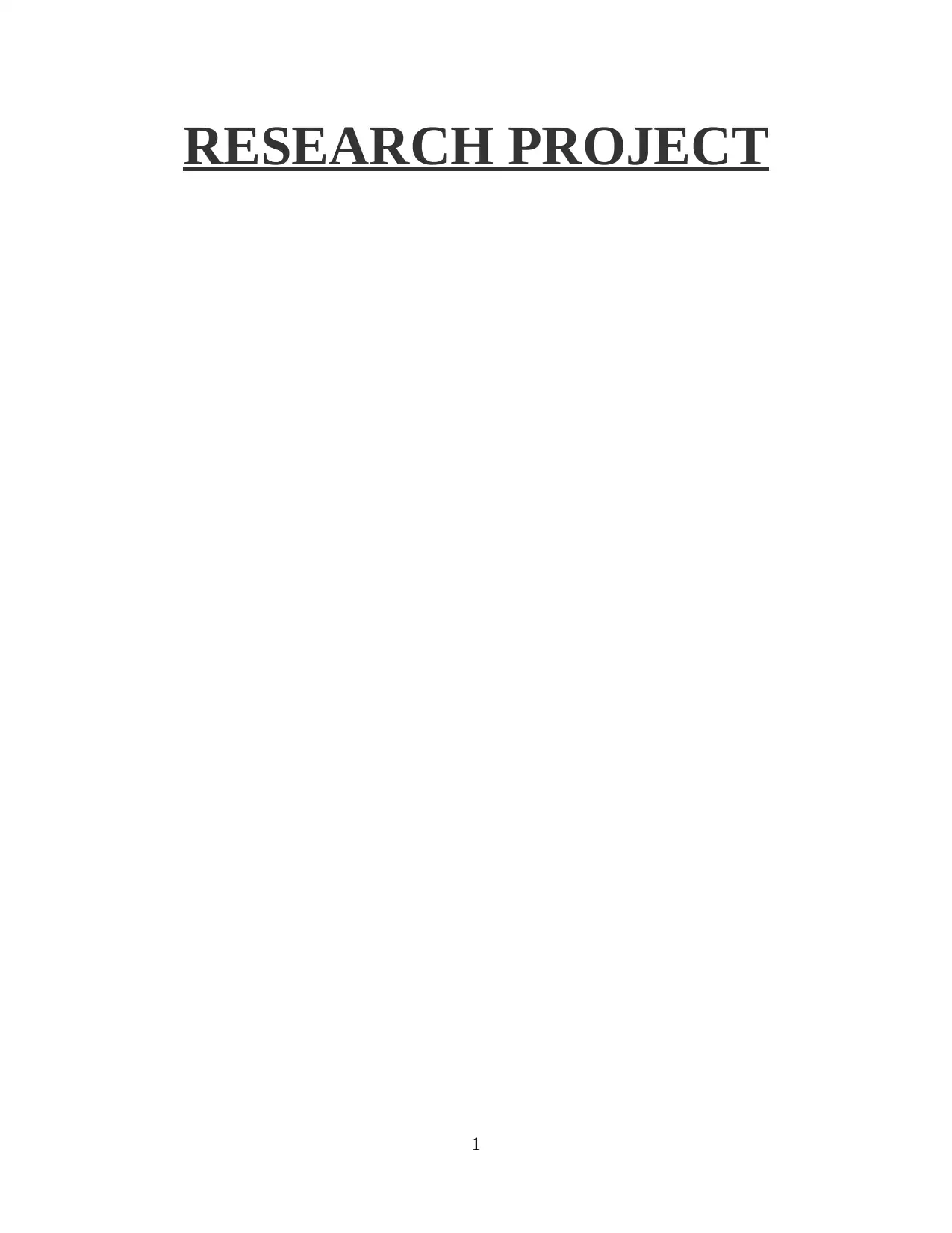
RESEARCH PROJECT
1
1
Paraphrase This Document
Need a fresh take? Get an instant paraphrase of this document with our AI Paraphraser
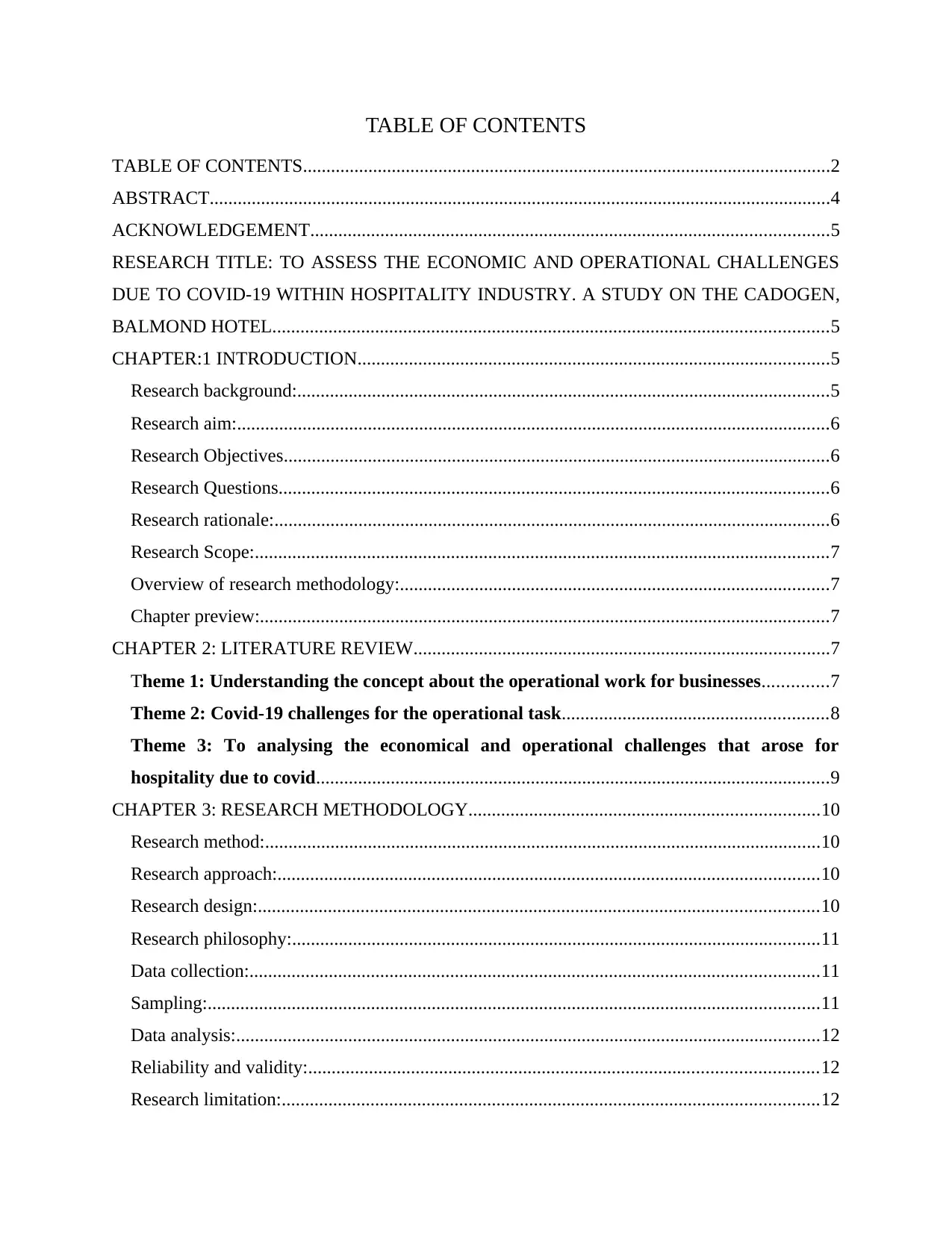
TABLE OF CONTENTS
TABLE OF CONTENTS.................................................................................................................2
ABSTRACT.....................................................................................................................................4
ACKNOWLEDGEMENT...............................................................................................................5
RESEARCH TITLE: TO ASSESS THE ECONOMIC AND OPERATIONAL CHALLENGES
DUE TO COVID-19 WITHIN HOSPITALITY INDUSTRY. A STUDY ON THE CADOGEN,
BALMOND HOTEL.......................................................................................................................5
CHAPTER:1 INTRODUCTION.....................................................................................................5
Research background:..................................................................................................................5
Research aim:...............................................................................................................................6
Research Objectives.....................................................................................................................6
Research Questions......................................................................................................................6
Research rationale:.......................................................................................................................6
Research Scope:...........................................................................................................................7
Overview of research methodology:............................................................................................7
Chapter preview:..........................................................................................................................7
CHAPTER 2: LITERATURE REVIEW.........................................................................................7
Theme 1: Understanding the concept about the operational work for businesses..............7
Theme 2: Covid-19 challenges for the operational task.........................................................8
Theme 3: To analysing the economical and operational challenges that arose for
hospitality due to covid..............................................................................................................9
CHAPTER 3: RESEARCH METHODOLOGY...........................................................................10
Research method:.......................................................................................................................10
Research approach:....................................................................................................................10
Research design:........................................................................................................................10
Research philosophy:.................................................................................................................11
Data collection:..........................................................................................................................11
Sampling:...................................................................................................................................11
Data analysis:.............................................................................................................................12
Reliability and validity:.............................................................................................................12
Research limitation:...................................................................................................................12
TABLE OF CONTENTS.................................................................................................................2
ABSTRACT.....................................................................................................................................4
ACKNOWLEDGEMENT...............................................................................................................5
RESEARCH TITLE: TO ASSESS THE ECONOMIC AND OPERATIONAL CHALLENGES
DUE TO COVID-19 WITHIN HOSPITALITY INDUSTRY. A STUDY ON THE CADOGEN,
BALMOND HOTEL.......................................................................................................................5
CHAPTER:1 INTRODUCTION.....................................................................................................5
Research background:..................................................................................................................5
Research aim:...............................................................................................................................6
Research Objectives.....................................................................................................................6
Research Questions......................................................................................................................6
Research rationale:.......................................................................................................................6
Research Scope:...........................................................................................................................7
Overview of research methodology:............................................................................................7
Chapter preview:..........................................................................................................................7
CHAPTER 2: LITERATURE REVIEW.........................................................................................7
Theme 1: Understanding the concept about the operational work for businesses..............7
Theme 2: Covid-19 challenges for the operational task.........................................................8
Theme 3: To analysing the economical and operational challenges that arose for
hospitality due to covid..............................................................................................................9
CHAPTER 3: RESEARCH METHODOLOGY...........................................................................10
Research method:.......................................................................................................................10
Research approach:....................................................................................................................10
Research design:........................................................................................................................10
Research philosophy:.................................................................................................................11
Data collection:..........................................................................................................................11
Sampling:...................................................................................................................................11
Data analysis:.............................................................................................................................12
Reliability and validity:.............................................................................................................12
Research limitation:...................................................................................................................12
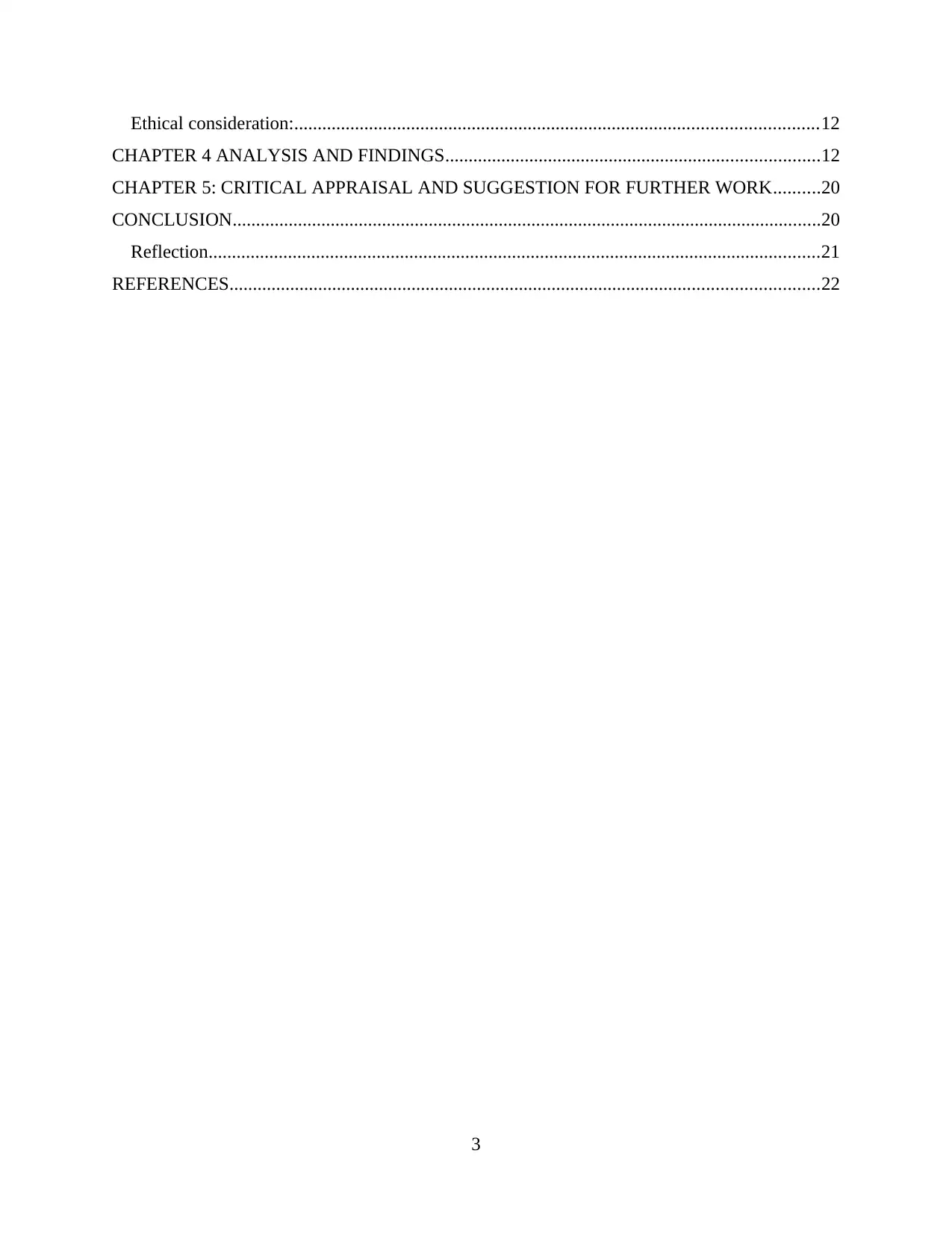
Ethical consideration:................................................................................................................12
CHAPTER 4 ANALYSIS AND FINDINGS................................................................................12
CHAPTER 5: CRITICAL APPRAISAL AND SUGGESTION FOR FURTHER WORK..........20
CONCLUSION..............................................................................................................................20
Reflection...................................................................................................................................21
REFERENCES..............................................................................................................................22
3
CHAPTER 4 ANALYSIS AND FINDINGS................................................................................12
CHAPTER 5: CRITICAL APPRAISAL AND SUGGESTION FOR FURTHER WORK..........20
CONCLUSION..............................................................................................................................20
Reflection...................................................................................................................................21
REFERENCES..............................................................................................................................22
3
⊘ This is a preview!⊘
Do you want full access?
Subscribe today to unlock all pages.

Trusted by 1+ million students worldwide
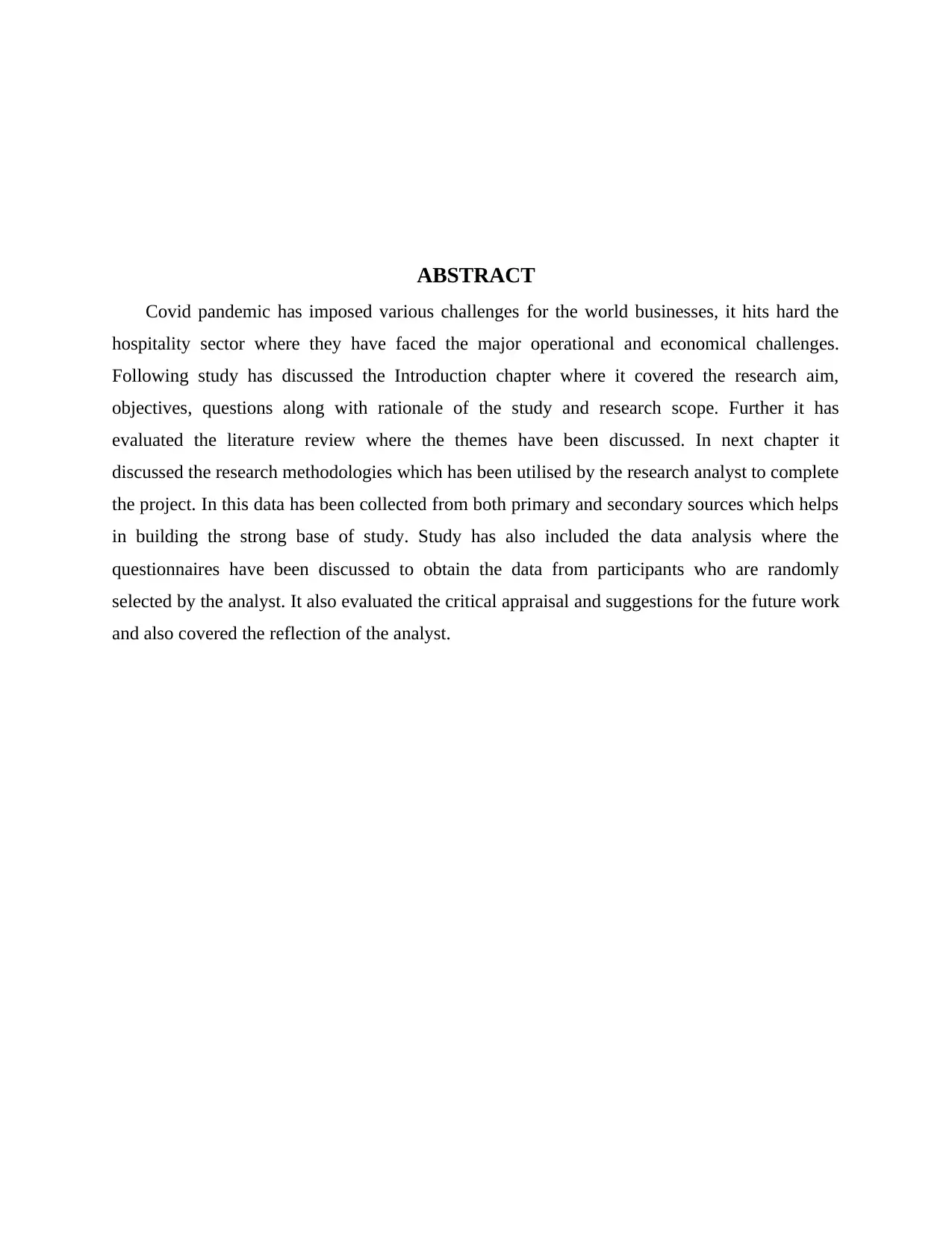
ABSTRACT
Covid pandemic has imposed various challenges for the world businesses, it hits hard the
hospitality sector where they have faced the major operational and economical challenges.
Following study has discussed the Introduction chapter where it covered the research aim,
objectives, questions along with rationale of the study and research scope. Further it has
evaluated the literature review where the themes have been discussed. In next chapter it
discussed the research methodologies which has been utilised by the research analyst to complete
the project. In this data has been collected from both primary and secondary sources which helps
in building the strong base of study. Study has also included the data analysis where the
questionnaires have been discussed to obtain the data from participants who are randomly
selected by the analyst. It also evaluated the critical appraisal and suggestions for the future work
and also covered the reflection of the analyst.
Covid pandemic has imposed various challenges for the world businesses, it hits hard the
hospitality sector where they have faced the major operational and economical challenges.
Following study has discussed the Introduction chapter where it covered the research aim,
objectives, questions along with rationale of the study and research scope. Further it has
evaluated the literature review where the themes have been discussed. In next chapter it
discussed the research methodologies which has been utilised by the research analyst to complete
the project. In this data has been collected from both primary and secondary sources which helps
in building the strong base of study. Study has also included the data analysis where the
questionnaires have been discussed to obtain the data from participants who are randomly
selected by the analyst. It also evaluated the critical appraisal and suggestions for the future work
and also covered the reflection of the analyst.
Paraphrase This Document
Need a fresh take? Get an instant paraphrase of this document with our AI Paraphraser
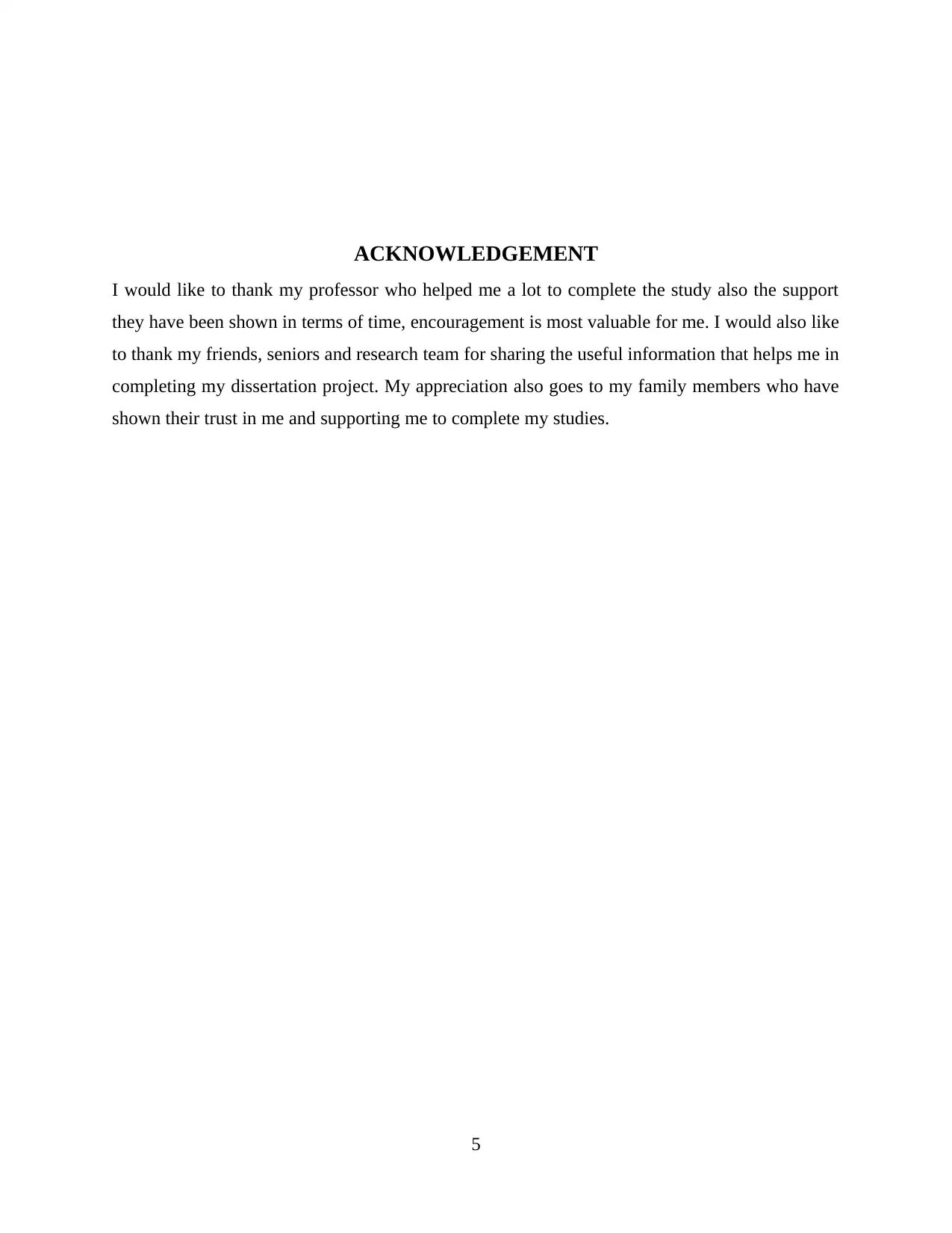
ACKNOWLEDGEMENT
I would like to thank my professor who helped me a lot to complete the study also the support
they have been shown in terms of time, encouragement is most valuable for me. I would also like
to thank my friends, seniors and research team for sharing the useful information that helps me in
completing my dissertation project. My appreciation also goes to my family members who have
shown their trust in me and supporting me to complete my studies.
5
I would like to thank my professor who helped me a lot to complete the study also the support
they have been shown in terms of time, encouragement is most valuable for me. I would also like
to thank my friends, seniors and research team for sharing the useful information that helps me in
completing my dissertation project. My appreciation also goes to my family members who have
shown their trust in me and supporting me to complete my studies.
5
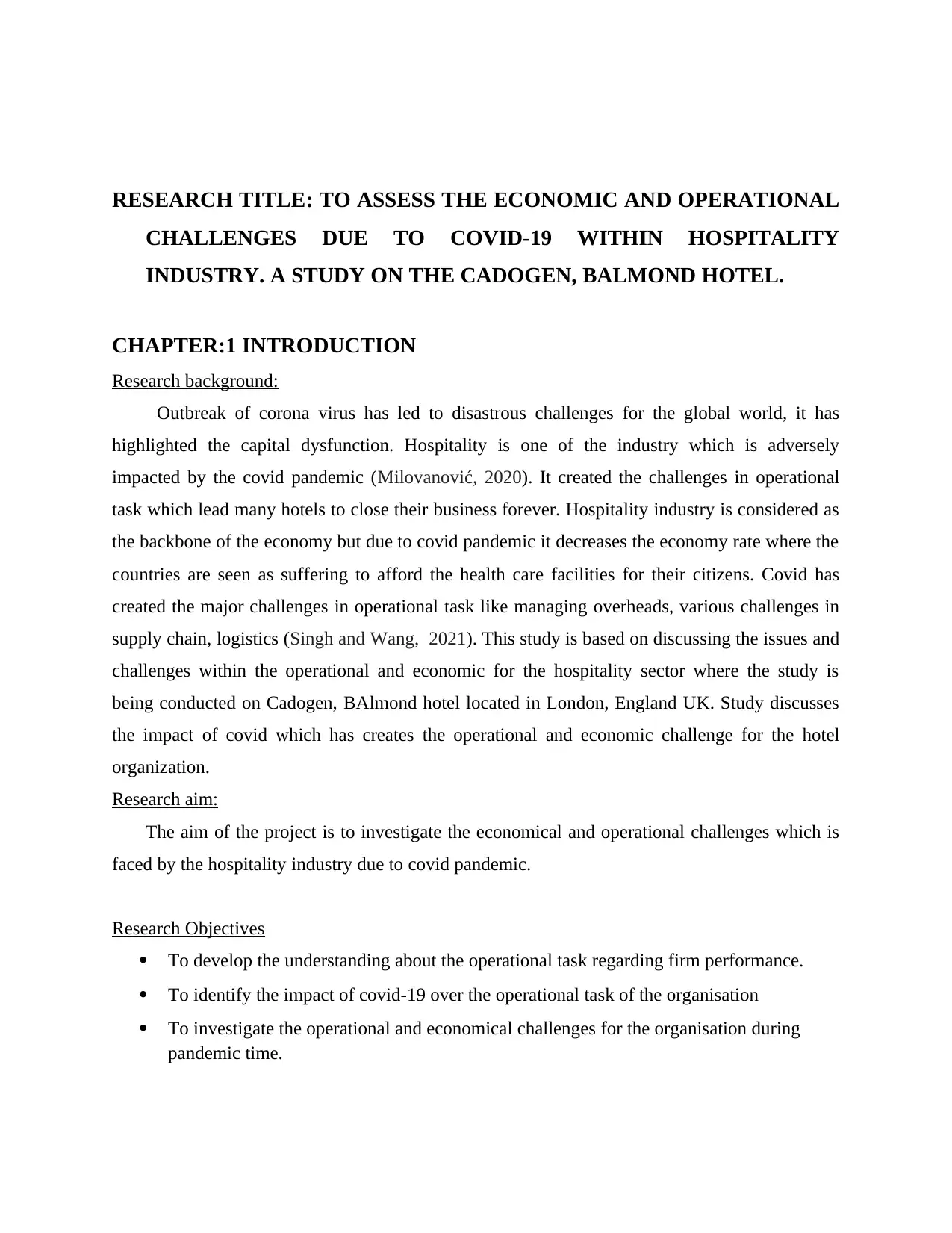
RESEARCH TITLE: TO ASSESS THE ECONOMIC AND OPERATIONAL
CHALLENGES DUE TO COVID-19 WITHIN HOSPITALITY
INDUSTRY. A STUDY ON THE CADOGEN, BALMOND HOTEL.
CHAPTER:1 INTRODUCTION
Research background:
Outbreak of corona virus has led to disastrous challenges for the global world, it has
highlighted the capital dysfunction. Hospitality is one of the industry which is adversely
impacted by the covid pandemic (Milovanović, 2020). It created the challenges in operational
task which lead many hotels to close their business forever. Hospitality industry is considered as
the backbone of the economy but due to covid pandemic it decreases the economy rate where the
countries are seen as suffering to afford the health care facilities for their citizens. Covid has
created the major challenges in operational task like managing overheads, various challenges in
supply chain, logistics (Singh and Wang, 2021). This study is based on discussing the issues and
challenges within the operational and economic for the hospitality sector where the study is
being conducted on Cadogen, BAlmond hotel located in London, England UK. Study discusses
the impact of covid which has creates the operational and economic challenge for the hotel
organization.
Research aim:
The aim of the project is to investigate the economical and operational challenges which is
faced by the hospitality industry due to covid pandemic.
Research Objectives
To develop the understanding about the operational task regarding firm performance.
To identify the impact of covid-19 over the operational task of the organisation
To investigate the operational and economical challenges for the organisation during
pandemic time.
CHALLENGES DUE TO COVID-19 WITHIN HOSPITALITY
INDUSTRY. A STUDY ON THE CADOGEN, BALMOND HOTEL.
CHAPTER:1 INTRODUCTION
Research background:
Outbreak of corona virus has led to disastrous challenges for the global world, it has
highlighted the capital dysfunction. Hospitality is one of the industry which is adversely
impacted by the covid pandemic (Milovanović, 2020). It created the challenges in operational
task which lead many hotels to close their business forever. Hospitality industry is considered as
the backbone of the economy but due to covid pandemic it decreases the economy rate where the
countries are seen as suffering to afford the health care facilities for their citizens. Covid has
created the major challenges in operational task like managing overheads, various challenges in
supply chain, logistics (Singh and Wang, 2021). This study is based on discussing the issues and
challenges within the operational and economic for the hospitality sector where the study is
being conducted on Cadogen, BAlmond hotel located in London, England UK. Study discusses
the impact of covid which has creates the operational and economic challenge for the hotel
organization.
Research aim:
The aim of the project is to investigate the economical and operational challenges which is
faced by the hospitality industry due to covid pandemic.
Research Objectives
To develop the understanding about the operational task regarding firm performance.
To identify the impact of covid-19 over the operational task of the organisation
To investigate the operational and economical challenges for the organisation during
pandemic time.
⊘ This is a preview!⊘
Do you want full access?
Subscribe today to unlock all pages.

Trusted by 1+ million students worldwide
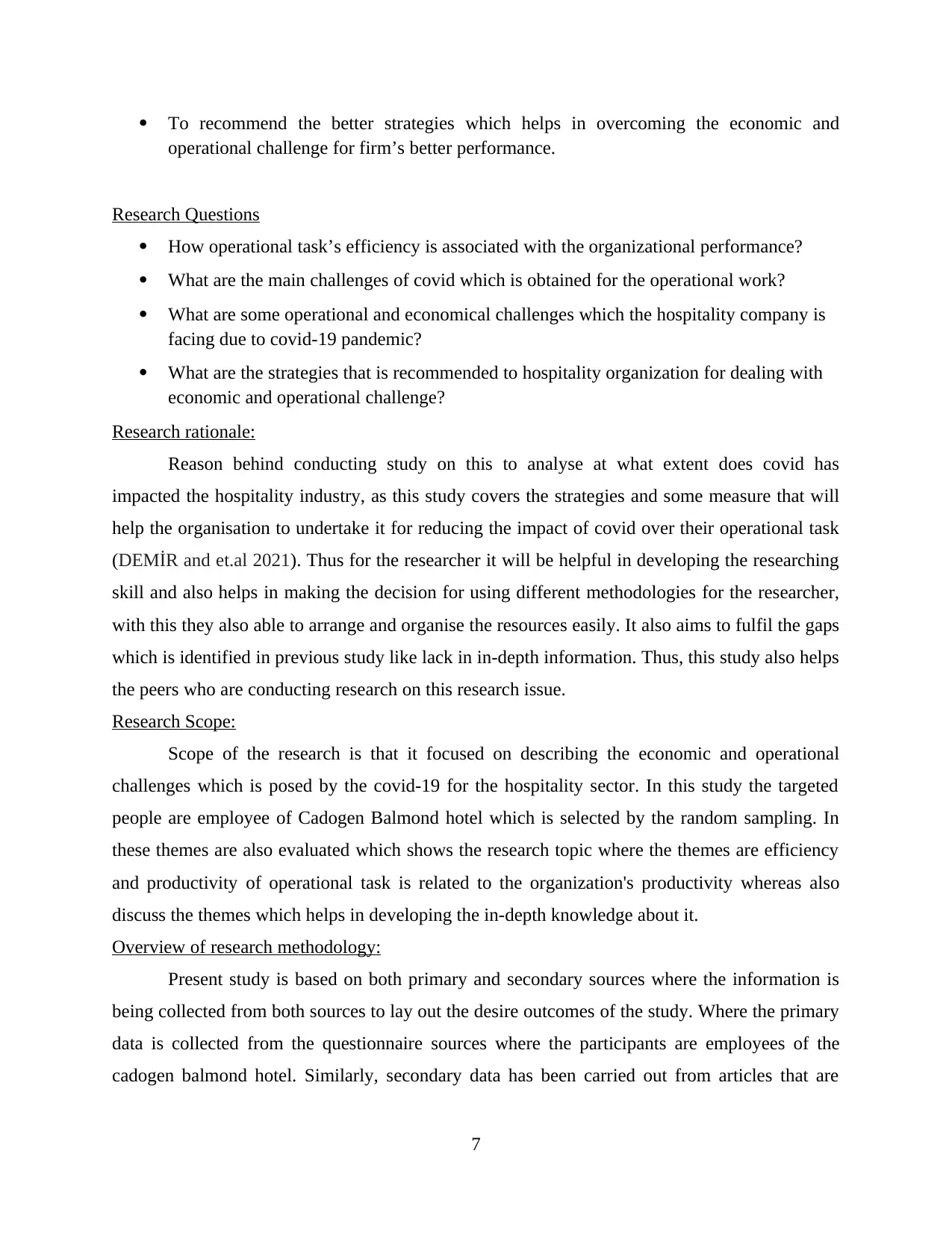
To recommend the better strategies which helps in overcoming the economic and
operational challenge for firm’s better performance.
Research Questions
How operational task’s efficiency is associated with the organizational performance?
What are the main challenges of covid which is obtained for the operational work?
What are some operational and economical challenges which the hospitality company is
facing due to covid-19 pandemic?
What are the strategies that is recommended to hospitality organization for dealing with
economic and operational challenge?
Research rationale:
Reason behind conducting study on this to analyse at what extent does covid has
impacted the hospitality industry, as this study covers the strategies and some measure that will
help the organisation to undertake it for reducing the impact of covid over their operational task
(DEMİR and et.al 2021). Thus for the researcher it will be helpful in developing the researching
skill and also helps in making the decision for using different methodologies for the researcher,
with this they also able to arrange and organise the resources easily. It also aims to fulfil the gaps
which is identified in previous study like lack in in-depth information. Thus, this study also helps
the peers who are conducting research on this research issue.
Research Scope:
Scope of the research is that it focused on describing the economic and operational
challenges which is posed by the covid-19 for the hospitality sector. In this study the targeted
people are employee of Cadogen Balmond hotel which is selected by the random sampling. In
these themes are also evaluated which shows the research topic where the themes are efficiency
and productivity of operational task is related to the organization's productivity whereas also
discuss the themes which helps in developing the in-depth knowledge about it.
Overview of research methodology:
Present study is based on both primary and secondary sources where the information is
being collected from both sources to lay out the desire outcomes of the study. Where the primary
data is collected from the questionnaire sources where the participants are employees of the
cadogen balmond hotel. Similarly, secondary data has been carried out from articles that are
7
operational challenge for firm’s better performance.
Research Questions
How operational task’s efficiency is associated with the organizational performance?
What are the main challenges of covid which is obtained for the operational work?
What are some operational and economical challenges which the hospitality company is
facing due to covid-19 pandemic?
What are the strategies that is recommended to hospitality organization for dealing with
economic and operational challenge?
Research rationale:
Reason behind conducting study on this to analyse at what extent does covid has
impacted the hospitality industry, as this study covers the strategies and some measure that will
help the organisation to undertake it for reducing the impact of covid over their operational task
(DEMİR and et.al 2021). Thus for the researcher it will be helpful in developing the researching
skill and also helps in making the decision for using different methodologies for the researcher,
with this they also able to arrange and organise the resources easily. It also aims to fulfil the gaps
which is identified in previous study like lack in in-depth information. Thus, this study also helps
the peers who are conducting research on this research issue.
Research Scope:
Scope of the research is that it focused on describing the economic and operational
challenges which is posed by the covid-19 for the hospitality sector. In this study the targeted
people are employee of Cadogen Balmond hotel which is selected by the random sampling. In
these themes are also evaluated which shows the research topic where the themes are efficiency
and productivity of operational task is related to the organization's productivity whereas also
discuss the themes which helps in developing the in-depth knowledge about it.
Overview of research methodology:
Present study is based on both primary and secondary sources where the information is
being collected from both sources to lay out the desire outcomes of the study. Where the primary
data is collected from the questionnaire sources where the participants are employees of the
cadogen balmond hotel. Similarly, secondary data has been carried out from articles that are
7
Paraphrase This Document
Need a fresh take? Get an instant paraphrase of this document with our AI Paraphraser
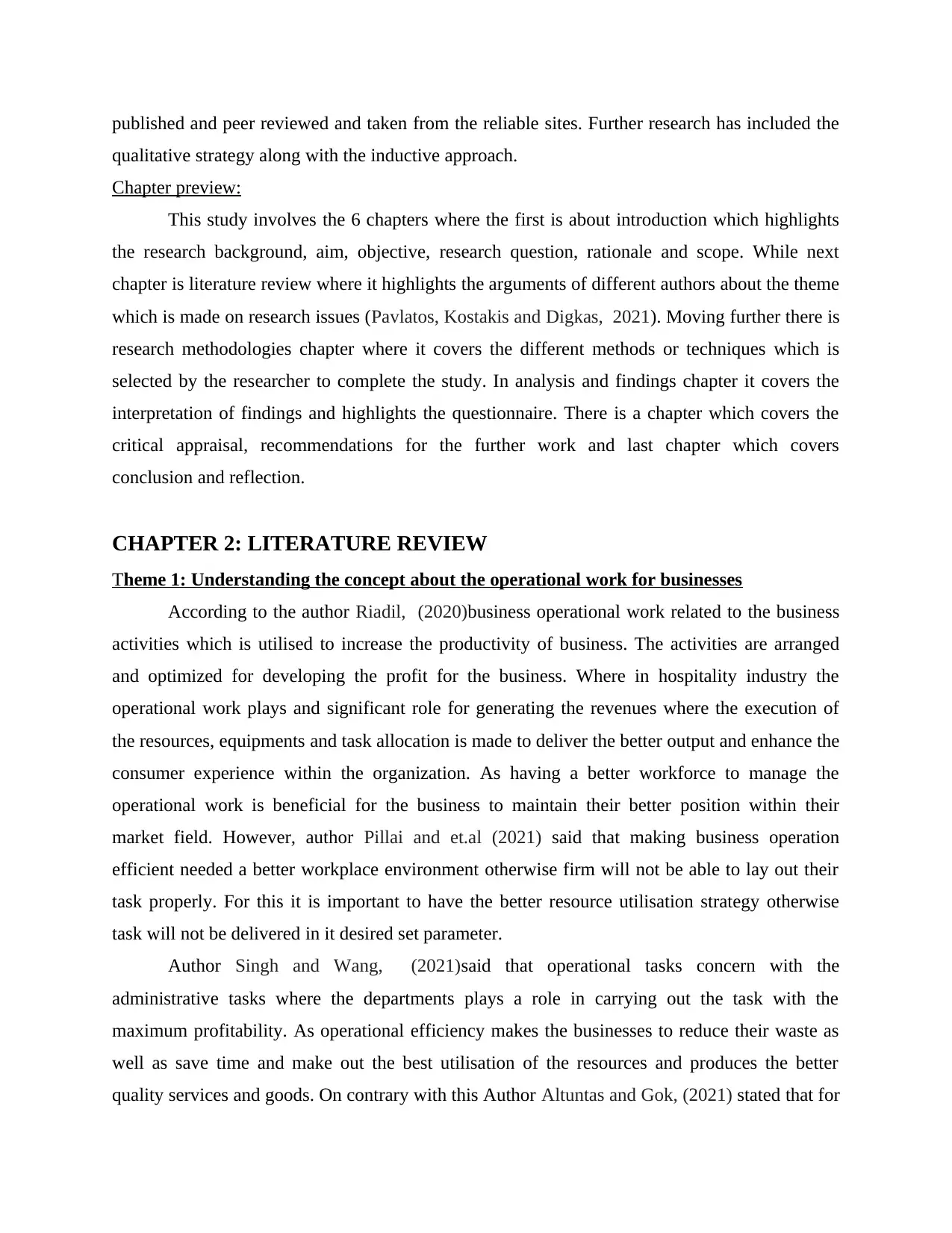
published and peer reviewed and taken from the reliable sites. Further research has included the
qualitative strategy along with the inductive approach.
Chapter preview:
This study involves the 6 chapters where the first is about introduction which highlights
the research background, aim, objective, research question, rationale and scope. While next
chapter is literature review where it highlights the arguments of different authors about the theme
which is made on research issues (Pavlatos, Kostakis and Digkas, 2021). Moving further there is
research methodologies chapter where it covers the different methods or techniques which is
selected by the researcher to complete the study. In analysis and findings chapter it covers the
interpretation of findings and highlights the questionnaire. There is a chapter which covers the
critical appraisal, recommendations for the further work and last chapter which covers
conclusion and reflection.
CHAPTER 2: LITERATURE REVIEW
Theme 1: Understanding the concept about the operational work for businesses
According to the author Riadil, (2020)business operational work related to the business
activities which is utilised to increase the productivity of business. The activities are arranged
and optimized for developing the profit for the business. Where in hospitality industry the
operational work plays and significant role for generating the revenues where the execution of
the resources, equipments and task allocation is made to deliver the better output and enhance the
consumer experience within the organization. As having a better workforce to manage the
operational work is beneficial for the business to maintain their better position within their
market field. However, author Pillai and et.al (2021) said that making business operation
efficient needed a better workplace environment otherwise firm will not be able to lay out their
task properly. For this it is important to have the better resource utilisation strategy otherwise
task will not be delivered in it desired set parameter.
Author Singh and Wang, (2021)said that operational tasks concern with the
administrative tasks where the departments plays a role in carrying out the task with the
maximum profitability. As operational efficiency makes the businesses to reduce their waste as
well as save time and make out the best utilisation of the resources and produces the better
quality services and goods. On contrary with this Author Altuntas and Gok, (2021) stated that for
qualitative strategy along with the inductive approach.
Chapter preview:
This study involves the 6 chapters where the first is about introduction which highlights
the research background, aim, objective, research question, rationale and scope. While next
chapter is literature review where it highlights the arguments of different authors about the theme
which is made on research issues (Pavlatos, Kostakis and Digkas, 2021). Moving further there is
research methodologies chapter where it covers the different methods or techniques which is
selected by the researcher to complete the study. In analysis and findings chapter it covers the
interpretation of findings and highlights the questionnaire. There is a chapter which covers the
critical appraisal, recommendations for the further work and last chapter which covers
conclusion and reflection.
CHAPTER 2: LITERATURE REVIEW
Theme 1: Understanding the concept about the operational work for businesses
According to the author Riadil, (2020)business operational work related to the business
activities which is utilised to increase the productivity of business. The activities are arranged
and optimized for developing the profit for the business. Where in hospitality industry the
operational work plays and significant role for generating the revenues where the execution of
the resources, equipments and task allocation is made to deliver the better output and enhance the
consumer experience within the organization. As having a better workforce to manage the
operational work is beneficial for the business to maintain their better position within their
market field. However, author Pillai and et.al (2021) said that making business operation
efficient needed a better workplace environment otherwise firm will not be able to lay out their
task properly. For this it is important to have the better resource utilisation strategy otherwise
task will not be delivered in it desired set parameter.
Author Singh and Wang, (2021)said that operational tasks concern with the
administrative tasks where the departments plays a role in carrying out the task with the
maximum profitability. As operational efficiency makes the businesses to reduce their waste as
well as save time and make out the best utilisation of the resources and produces the better
quality services and goods. On contrary with this Author Altuntas and Gok, (2021) stated that for
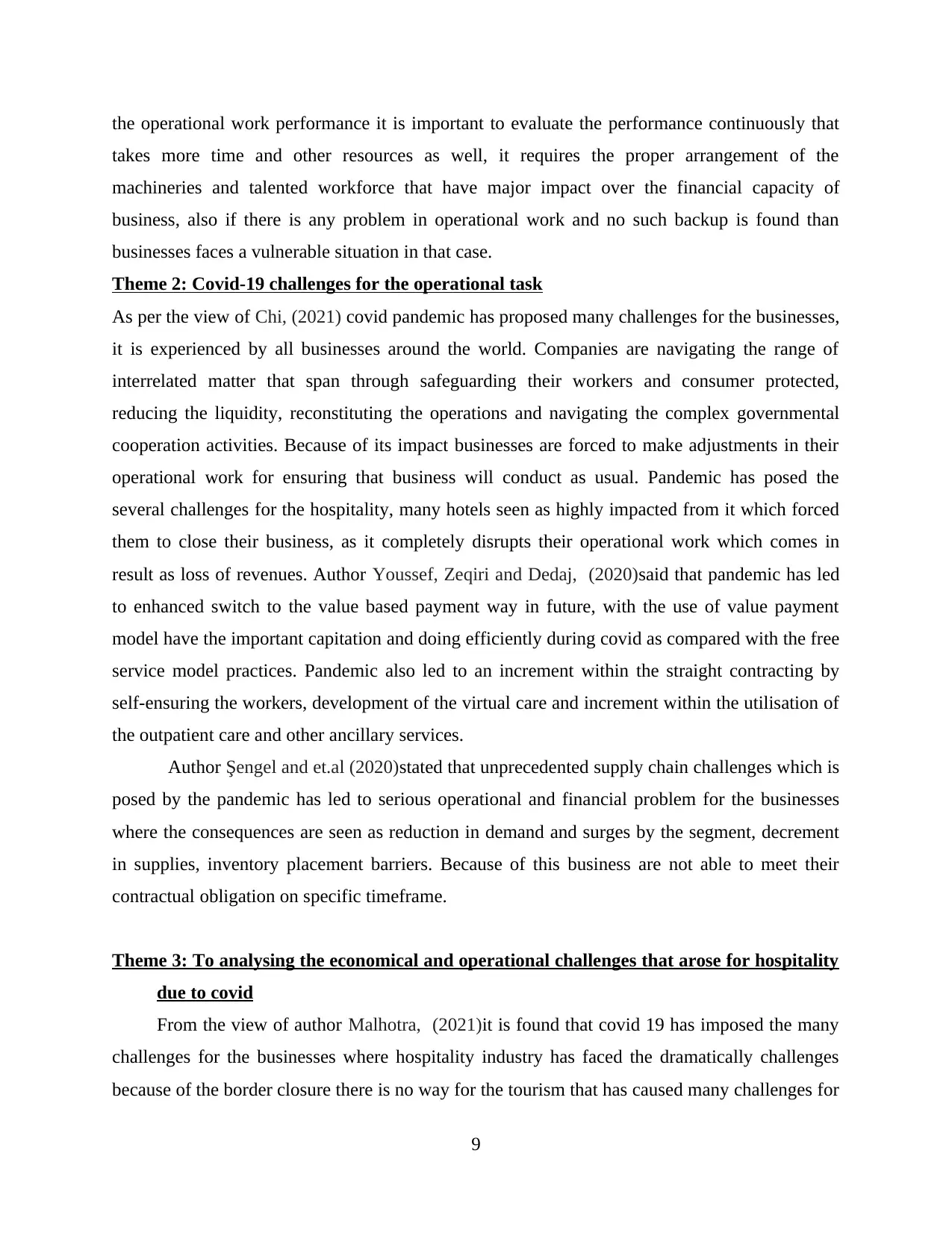
the operational work performance it is important to evaluate the performance continuously that
takes more time and other resources as well, it requires the proper arrangement of the
machineries and talented workforce that have major impact over the financial capacity of
business, also if there is any problem in operational work and no such backup is found than
businesses faces a vulnerable situation in that case.
Theme 2: Covid-19 challenges for the operational task
As per the view of Chi, (2021) covid pandemic has proposed many challenges for the businesses,
it is experienced by all businesses around the world. Companies are navigating the range of
interrelated matter that span through safeguarding their workers and consumer protected,
reducing the liquidity, reconstituting the operations and navigating the complex governmental
cooperation activities. Because of its impact businesses are forced to make adjustments in their
operational work for ensuring that business will conduct as usual. Pandemic has posed the
several challenges for the hospitality, many hotels seen as highly impacted from it which forced
them to close their business, as it completely disrupts their operational work which comes in
result as loss of revenues. Author Youssef, Zeqiri and Dedaj, (2020)said that pandemic has led
to enhanced switch to the value based payment way in future, with the use of value payment
model have the important capitation and doing efficiently during covid as compared with the free
service model practices. Pandemic also led to an increment within the straight contracting by
self-ensuring the workers, development of the virtual care and increment within the utilisation of
the outpatient care and other ancillary services.
Author Şengel and et.al (2020)stated that unprecedented supply chain challenges which is
posed by the pandemic has led to serious operational and financial problem for the businesses
where the consequences are seen as reduction in demand and surges by the segment, decrement
in supplies, inventory placement barriers. Because of this business are not able to meet their
contractual obligation on specific timeframe.
Theme 3: To analysing the economical and operational challenges that arose for hospitality
due to covid
From the view of author Malhotra, (2021)it is found that covid 19 has imposed the many
challenges for the businesses where hospitality industry has faced the dramatically challenges
because of the border closure there is no way for the tourism that has caused many challenges for
9
takes more time and other resources as well, it requires the proper arrangement of the
machineries and talented workforce that have major impact over the financial capacity of
business, also if there is any problem in operational work and no such backup is found than
businesses faces a vulnerable situation in that case.
Theme 2: Covid-19 challenges for the operational task
As per the view of Chi, (2021) covid pandemic has proposed many challenges for the businesses,
it is experienced by all businesses around the world. Companies are navigating the range of
interrelated matter that span through safeguarding their workers and consumer protected,
reducing the liquidity, reconstituting the operations and navigating the complex governmental
cooperation activities. Because of its impact businesses are forced to make adjustments in their
operational work for ensuring that business will conduct as usual. Pandemic has posed the
several challenges for the hospitality, many hotels seen as highly impacted from it which forced
them to close their business, as it completely disrupts their operational work which comes in
result as loss of revenues. Author Youssef, Zeqiri and Dedaj, (2020)said that pandemic has led
to enhanced switch to the value based payment way in future, with the use of value payment
model have the important capitation and doing efficiently during covid as compared with the free
service model practices. Pandemic also led to an increment within the straight contracting by
self-ensuring the workers, development of the virtual care and increment within the utilisation of
the outpatient care and other ancillary services.
Author Şengel and et.al (2020)stated that unprecedented supply chain challenges which is
posed by the pandemic has led to serious operational and financial problem for the businesses
where the consequences are seen as reduction in demand and surges by the segment, decrement
in supplies, inventory placement barriers. Because of this business are not able to meet their
contractual obligation on specific timeframe.
Theme 3: To analysing the economical and operational challenges that arose for hospitality
due to covid
From the view of author Malhotra, (2021)it is found that covid 19 has imposed the many
challenges for the businesses where hospitality industry has faced the dramatically challenges
because of the border closure there is no way for the tourism that has caused many challenges for
9
⊘ This is a preview!⊘
Do you want full access?
Subscribe today to unlock all pages.

Trusted by 1+ million students worldwide
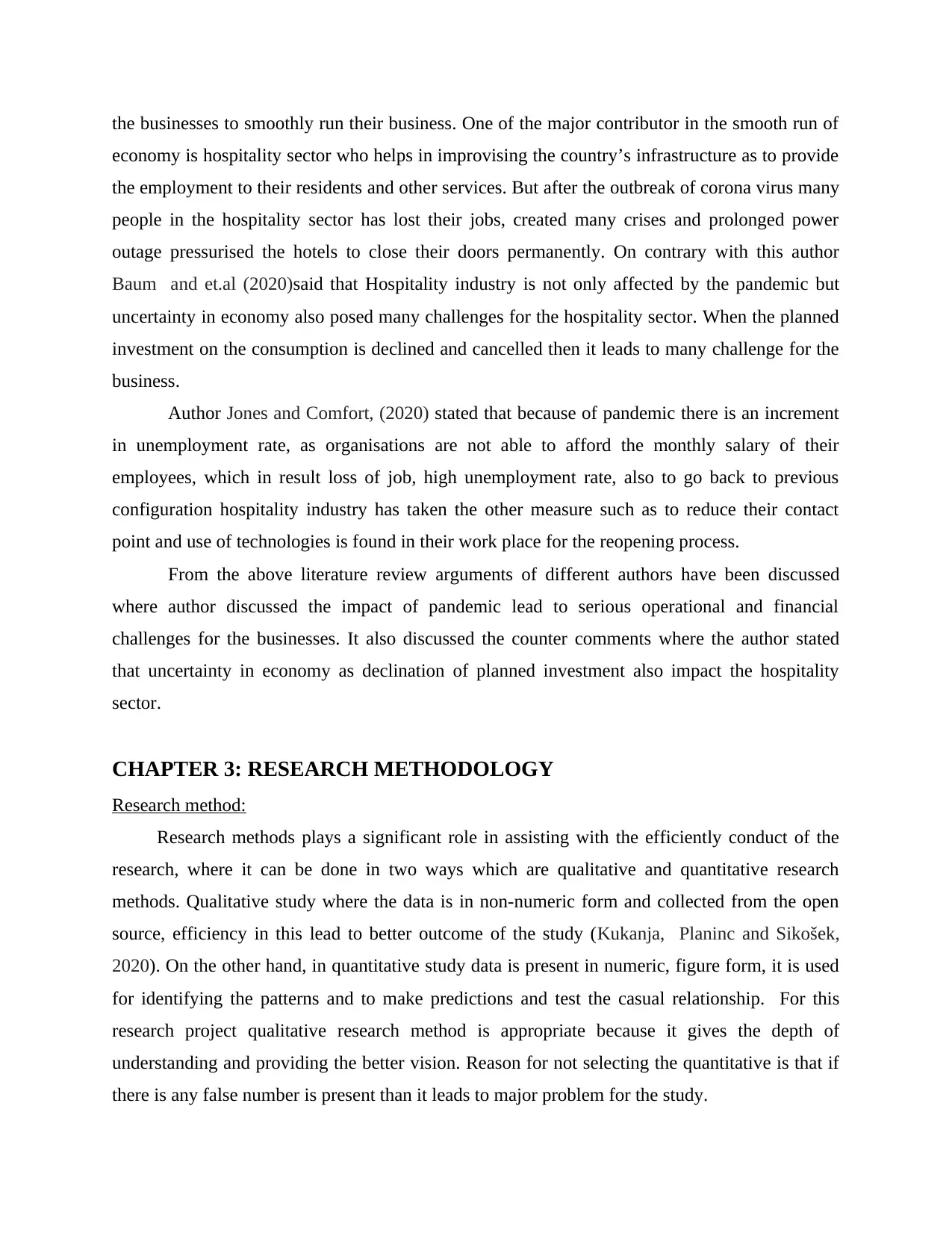
the businesses to smoothly run their business. One of the major contributor in the smooth run of
economy is hospitality sector who helps in improvising the country’s infrastructure as to provide
the employment to their residents and other services. But after the outbreak of corona virus many
people in the hospitality sector has lost their jobs, created many crises and prolonged power
outage pressurised the hotels to close their doors permanently. On contrary with this author
Baum and et.al (2020)said that Hospitality industry is not only affected by the pandemic but
uncertainty in economy also posed many challenges for the hospitality sector. When the planned
investment on the consumption is declined and cancelled then it leads to many challenge for the
business.
Author Jones and Comfort, (2020) stated that because of pandemic there is an increment
in unemployment rate, as organisations are not able to afford the monthly salary of their
employees, which in result loss of job, high unemployment rate, also to go back to previous
configuration hospitality industry has taken the other measure such as to reduce their contact
point and use of technologies is found in their work place for the reopening process.
From the above literature review arguments of different authors have been discussed
where author discussed the impact of pandemic lead to serious operational and financial
challenges for the businesses. It also discussed the counter comments where the author stated
that uncertainty in economy as declination of planned investment also impact the hospitality
sector.
CHAPTER 3: RESEARCH METHODOLOGY
Research method:
Research methods plays a significant role in assisting with the efficiently conduct of the
research, where it can be done in two ways which are qualitative and quantitative research
methods. Qualitative study where the data is in non-numeric form and collected from the open
source, efficiency in this lead to better outcome of the study (Kukanja, Planinc and Sikošek,
2020). On the other hand, in quantitative study data is present in numeric, figure form, it is used
for identifying the patterns and to make predictions and test the casual relationship. For this
research project qualitative research method is appropriate because it gives the depth of
understanding and providing the better vision. Reason for not selecting the quantitative is that if
there is any false number is present than it leads to major problem for the study.
economy is hospitality sector who helps in improvising the country’s infrastructure as to provide
the employment to their residents and other services. But after the outbreak of corona virus many
people in the hospitality sector has lost their jobs, created many crises and prolonged power
outage pressurised the hotels to close their doors permanently. On contrary with this author
Baum and et.al (2020)said that Hospitality industry is not only affected by the pandemic but
uncertainty in economy also posed many challenges for the hospitality sector. When the planned
investment on the consumption is declined and cancelled then it leads to many challenge for the
business.
Author Jones and Comfort, (2020) stated that because of pandemic there is an increment
in unemployment rate, as organisations are not able to afford the monthly salary of their
employees, which in result loss of job, high unemployment rate, also to go back to previous
configuration hospitality industry has taken the other measure such as to reduce their contact
point and use of technologies is found in their work place for the reopening process.
From the above literature review arguments of different authors have been discussed
where author discussed the impact of pandemic lead to serious operational and financial
challenges for the businesses. It also discussed the counter comments where the author stated
that uncertainty in economy as declination of planned investment also impact the hospitality
sector.
CHAPTER 3: RESEARCH METHODOLOGY
Research method:
Research methods plays a significant role in assisting with the efficiently conduct of the
research, where it can be done in two ways which are qualitative and quantitative research
methods. Qualitative study where the data is in non-numeric form and collected from the open
source, efficiency in this lead to better outcome of the study (Kukanja, Planinc and Sikošek,
2020). On the other hand, in quantitative study data is present in numeric, figure form, it is used
for identifying the patterns and to make predictions and test the casual relationship. For this
research project qualitative research method is appropriate because it gives the depth of
understanding and providing the better vision. Reason for not selecting the quantitative is that if
there is any false number is present than it leads to major problem for the study.
Paraphrase This Document
Need a fresh take? Get an instant paraphrase of this document with our AI Paraphraser
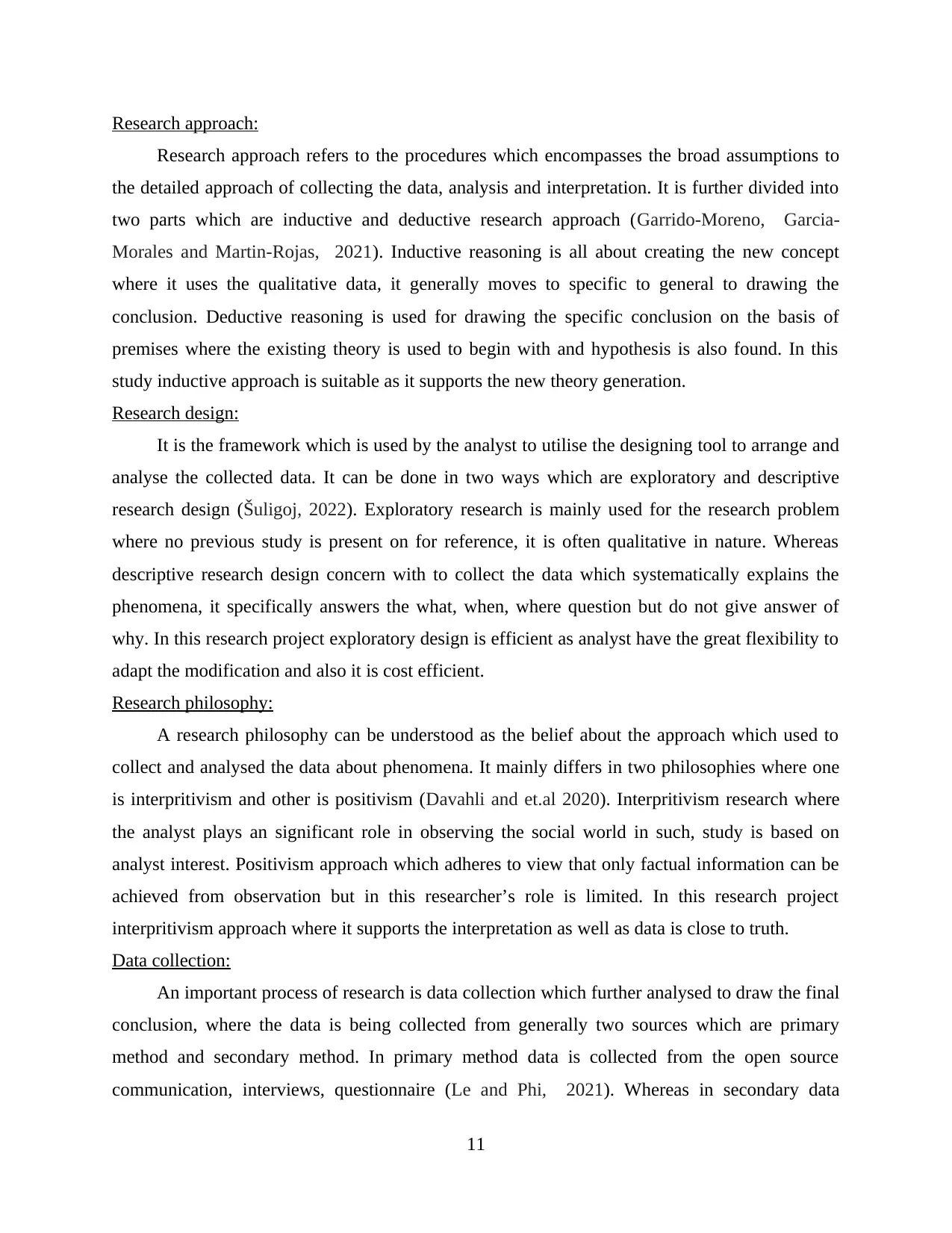
Research approach:
Research approach refers to the procedures which encompasses the broad assumptions to
the detailed approach of collecting the data, analysis and interpretation. It is further divided into
two parts which are inductive and deductive research approach (Garrido-Moreno, Garcia-
Morales and Martin-Rojas, 2021). Inductive reasoning is all about creating the new concept
where it uses the qualitative data, it generally moves to specific to general to drawing the
conclusion. Deductive reasoning is used for drawing the specific conclusion on the basis of
premises where the existing theory is used to begin with and hypothesis is also found. In this
study inductive approach is suitable as it supports the new theory generation.
Research design:
It is the framework which is used by the analyst to utilise the designing tool to arrange and
analyse the collected data. It can be done in two ways which are exploratory and descriptive
research design (Šuligoj, 2022). Exploratory research is mainly used for the research problem
where no previous study is present on for reference, it is often qualitative in nature. Whereas
descriptive research design concern with to collect the data which systematically explains the
phenomena, it specifically answers the what, when, where question but do not give answer of
why. In this research project exploratory design is efficient as analyst have the great flexibility to
adapt the modification and also it is cost efficient.
Research philosophy:
A research philosophy can be understood as the belief about the approach which used to
collect and analysed the data about phenomena. It mainly differs in two philosophies where one
is interpritivism and other is positivism (Davahli and et.al 2020). Interpritivism research where
the analyst plays an significant role in observing the social world in such, study is based on
analyst interest. Positivism approach which adheres to view that only factual information can be
achieved from observation but in this researcher’s role is limited. In this research project
interpritivism approach where it supports the interpretation as well as data is close to truth.
Data collection:
An important process of research is data collection which further analysed to draw the final
conclusion, where the data is being collected from generally two sources which are primary
method and secondary method. In primary method data is collected from the open source
communication, interviews, questionnaire (Le and Phi, 2021). Whereas in secondary data
11
Research approach refers to the procedures which encompasses the broad assumptions to
the detailed approach of collecting the data, analysis and interpretation. It is further divided into
two parts which are inductive and deductive research approach (Garrido-Moreno, Garcia-
Morales and Martin-Rojas, 2021). Inductive reasoning is all about creating the new concept
where it uses the qualitative data, it generally moves to specific to general to drawing the
conclusion. Deductive reasoning is used for drawing the specific conclusion on the basis of
premises where the existing theory is used to begin with and hypothesis is also found. In this
study inductive approach is suitable as it supports the new theory generation.
Research design:
It is the framework which is used by the analyst to utilise the designing tool to arrange and
analyse the collected data. It can be done in two ways which are exploratory and descriptive
research design (Šuligoj, 2022). Exploratory research is mainly used for the research problem
where no previous study is present on for reference, it is often qualitative in nature. Whereas
descriptive research design concern with to collect the data which systematically explains the
phenomena, it specifically answers the what, when, where question but do not give answer of
why. In this research project exploratory design is efficient as analyst have the great flexibility to
adapt the modification and also it is cost efficient.
Research philosophy:
A research philosophy can be understood as the belief about the approach which used to
collect and analysed the data about phenomena. It mainly differs in two philosophies where one
is interpritivism and other is positivism (Davahli and et.al 2020). Interpritivism research where
the analyst plays an significant role in observing the social world in such, study is based on
analyst interest. Positivism approach which adheres to view that only factual information can be
achieved from observation but in this researcher’s role is limited. In this research project
interpritivism approach where it supports the interpretation as well as data is close to truth.
Data collection:
An important process of research is data collection which further analysed to draw the final
conclusion, where the data is being collected from generally two sources which are primary
method and secondary method. In primary method data is collected from the open source
communication, interviews, questionnaire (Le and Phi, 2021). Whereas in secondary data
11
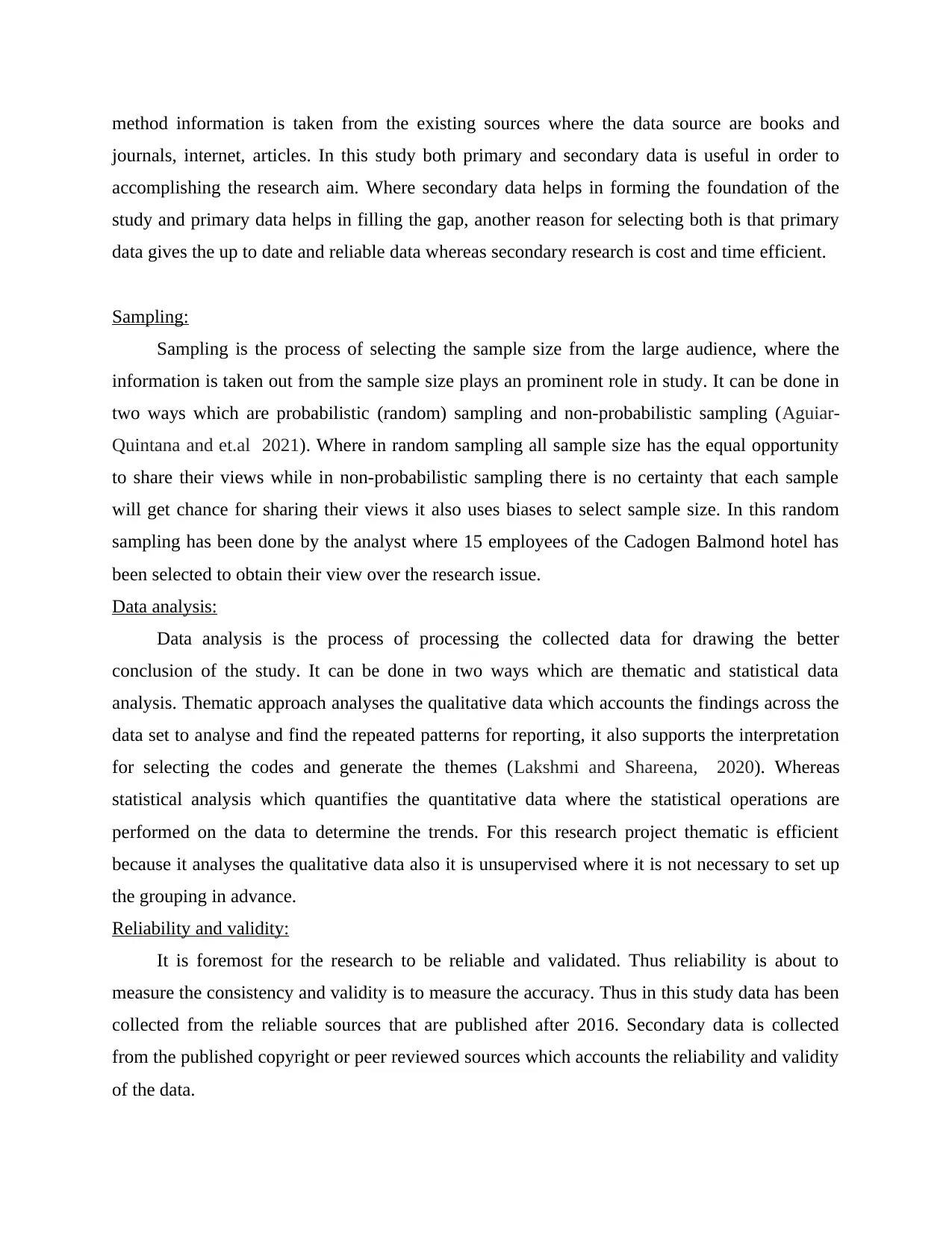
method information is taken from the existing sources where the data source are books and
journals, internet, articles. In this study both primary and secondary data is useful in order to
accomplishing the research aim. Where secondary data helps in forming the foundation of the
study and primary data helps in filling the gap, another reason for selecting both is that primary
data gives the up to date and reliable data whereas secondary research is cost and time efficient.
Sampling:
Sampling is the process of selecting the sample size from the large audience, where the
information is taken out from the sample size plays an prominent role in study. It can be done in
two ways which are probabilistic (random) sampling and non-probabilistic sampling (Aguiar-
Quintana and et.al 2021). Where in random sampling all sample size has the equal opportunity
to share their views while in non-probabilistic sampling there is no certainty that each sample
will get chance for sharing their views it also uses biases to select sample size. In this random
sampling has been done by the analyst where 15 employees of the Cadogen Balmond hotel has
been selected to obtain their view over the research issue.
Data analysis:
Data analysis is the process of processing the collected data for drawing the better
conclusion of the study. It can be done in two ways which are thematic and statistical data
analysis. Thematic approach analyses the qualitative data which accounts the findings across the
data set to analyse and find the repeated patterns for reporting, it also supports the interpretation
for selecting the codes and generate the themes (Lakshmi and Shareena, 2020). Whereas
statistical analysis which quantifies the quantitative data where the statistical operations are
performed on the data to determine the trends. For this research project thematic is efficient
because it analyses the qualitative data also it is unsupervised where it is not necessary to set up
the grouping in advance.
Reliability and validity:
It is foremost for the research to be reliable and validated. Thus reliability is about to
measure the consistency and validity is to measure the accuracy. Thus in this study data has been
collected from the reliable sources that are published after 2016. Secondary data is collected
from the published copyright or peer reviewed sources which accounts the reliability and validity
of the data.
journals, internet, articles. In this study both primary and secondary data is useful in order to
accomplishing the research aim. Where secondary data helps in forming the foundation of the
study and primary data helps in filling the gap, another reason for selecting both is that primary
data gives the up to date and reliable data whereas secondary research is cost and time efficient.
Sampling:
Sampling is the process of selecting the sample size from the large audience, where the
information is taken out from the sample size plays an prominent role in study. It can be done in
two ways which are probabilistic (random) sampling and non-probabilistic sampling (Aguiar-
Quintana and et.al 2021). Where in random sampling all sample size has the equal opportunity
to share their views while in non-probabilistic sampling there is no certainty that each sample
will get chance for sharing their views it also uses biases to select sample size. In this random
sampling has been done by the analyst where 15 employees of the Cadogen Balmond hotel has
been selected to obtain their view over the research issue.
Data analysis:
Data analysis is the process of processing the collected data for drawing the better
conclusion of the study. It can be done in two ways which are thematic and statistical data
analysis. Thematic approach analyses the qualitative data which accounts the findings across the
data set to analyse and find the repeated patterns for reporting, it also supports the interpretation
for selecting the codes and generate the themes (Lakshmi and Shareena, 2020). Whereas
statistical analysis which quantifies the quantitative data where the statistical operations are
performed on the data to determine the trends. For this research project thematic is efficient
because it analyses the qualitative data also it is unsupervised where it is not necessary to set up
the grouping in advance.
Reliability and validity:
It is foremost for the research to be reliable and validated. Thus reliability is about to
measure the consistency and validity is to measure the accuracy. Thus in this study data has been
collected from the reliable sources that are published after 2016. Secondary data is collected
from the published copyright or peer reviewed sources which accounts the reliability and validity
of the data.
⊘ This is a preview!⊘
Do you want full access?
Subscribe today to unlock all pages.

Trusted by 1+ million students worldwide
1 out of 26
Related Documents
Your All-in-One AI-Powered Toolkit for Academic Success.
+13062052269
info@desklib.com
Available 24*7 on WhatsApp / Email
![[object Object]](/_next/static/media/star-bottom.7253800d.svg)
Unlock your academic potential
Copyright © 2020–2026 A2Z Services. All Rights Reserved. Developed and managed by ZUCOL.





